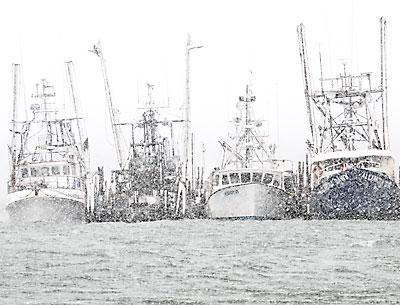Plan to Cut Fishermen’s Fuel Draws Ire

A bill sponsored by two East End legislators that aims to help commercial fishermen reduce their fuel costs is facing strong headwinds from the State Department of Environmental Conservation and from fishermen themselves.
State Senator Kenneth P. LaValle’s bill, which would permit fishermen to “aggregate” their daily catch limits over a seven-day period, has passed the Senate, but strong opposition to one part of the proposed law will likely kill it in the Assembly. Hank Lackner, captain of the Montauk dragger Jason and Danielle, went so far as to say that Mr. LaValle’s bill would lead to “the demise of commercial fishing in New York State.”
Although most species of value are managed under federal quota allocations to states, individual states control how their quotas are filled in state waters (up to three miles offshore) either by their management agencies or their legislatures.
The proposed law would conserve fuel by greatly reducing the number of days a vessel would have to put to sea. If a fisherman is currently allowed to catch 200 pounds of a given species per day, the proposed regulation would allow him or her to catch up to five days worth or 1,000 pounds of the species over a seven-day period.
In the past, the state has given its blessing to offshore fishermen to aggregate their catches during the winter months. Two years ago the state decided to let draggermen working on fluke during the winter do this.
However, the proposed law would also allow fishermen with permits governing different species to join forces in order to target their respective species on one vessel, again allowing more fishermen to keep their boats tied at the dock, and to chip in for fuel on the joint venture.
“The cumulative catch sounds great until you think about it. It’s going to increase latent effort tenfold,” Captain Lackner said, “latent effort” meaning the many part-time fishermen and others including charter boat captains who hold commercial licenses but do not use them full-time.
“The state has to find out which permits are active and which are not. You can’t put multiple permits on one boat. New York State has some of the lowest quotas in the Mid-Atlantic region. There’s no room for extra entrants. I’m all about less carbon footprint, fewer discards [fish thrown over the side dead after a trip limit is met]. This would actually increase discards. No one is going to stop fishing. This went under everyone’s noses. We never saw LaValle in Montauk and it’s the largest fishing port in the state,” Captain Lackner said.
Arnold Leo, secretary of the East Hampton Town Baymen’s Association, opposed the bill but from the perspective of the inshore fisherman. On Monday he said the idea of allowing fishermen to aggregate their daily catches had merit when quotas were low, “but now the scup quota is 400 pounds per day, that’s about 2,000 pounds per week. Now you’ve interested the trawlers. But the worst part of the bill for summer inshore fishermen, pinhookers [commercial rod and reel fishermen], and trappers is to have any number of permits on board. Five trawlers could go out once a week and catch 10,000 pounds of scup and destroy the price.”
The combined impact of compounded daily limits and a vessel sailing with a quiver of permits would create huge landings that put inshore fishermen at a great disadvantage in the market, Mr. Leo said.
Mr. Leo said the D.E.C. opposed the bill because of its potential effect on certain species such as fluke (summer flounder) and black sea bass. “Under the bill fluke and sea bass would be caught up in a flash, and the season would have to be closed,” Mr. Leo said. The agency did not respond to requests for comment on the issue.
“I don’t know what we’re going to do,” said Assemblyman Fred W. Thiele Jr., who has championed the bill in the State Assembly in the past. A similar bill was discussed a number of years ago.
“There are competing interests between the dragger owners and baymen. We are going to set up a meeting with the D.E.C., then sit down with the fishermen,” he said.
Mr. Thiele said he thought objections to the part of the bill that would aggregate daily quotas were surmountable, but the idea of grouping different permits on one vessel seemed to be the sticking point. He said it was, in part, the easing of fishing restrictions that justified larger quotas, causing concerns over glutted markets and the lower prices that result.
Reached yesterday, a spokesman for Senator LaValle said he expected the bill to be amended.
